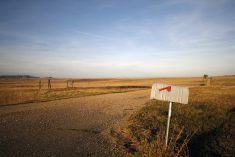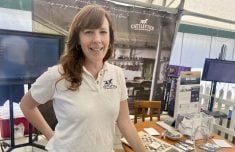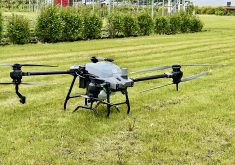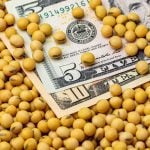With four sons who want to keep involved with the farm, the Stepplers are adjusting to five families
earning income from one operation. Here’s how they’re meeting the challenges
OBJECTIVE
Provide opportunities for four sons to get as involved as they want with farming
Maybe Andre Steppler is so consumed with cattle because he was almost born on a pasture 25 years ago while his mom Pat and his father Danny were checking cows on their farm near Deerwood, Man., an hour and a half southwest of Winnipeg.
Read Also

Producers aren’t panicking over tariffs and trade threats
The Manitoba Canola Growers Association (MCGA) surveyed its members this spring to get a sense of how trade uncertainty was…
Or perhaps his cattle attraction is genetic, although Andre doesn’t rule out the environment he was raised in either. For whatever reason, this youngest of four Steppler brothers who farm with their parents, eats, sleeps and breathes cattle, just as he has from the time he
CHALLENGE
Create a family-based, profitable growth plan that reduces risks and provides high work-life satisfaction
SOLUTION
The Stepplers have embraced a three-pronged strategy, including:
–incorporation –focus
–diversification
bottle-fed his first orphaned calf, Lydia, at age five. Lydia, by the way, was in the Steppler herd 13 years.
Growing up, when his friends were playing baseball, Andre was fencing with his dad. Instead of rhyming off hockey card statistics on the way to school, Andre recited the ancestry of the family’s purebred Charolais herd. It seemed his future would be on the farm, for sure.
Yet there’s a long way from childhood dreams to adult accomplishment, and it isn’t always an easy road.
In the Stepplers’ case, it has required a
roadmap for the entire family, filled with strategic choices that have made each of them adapt, including his parents and his three brothers.
It’s also a road that has led to stronger farm enterprise.
And yes, Andre can still reel off the cattle’s parentage. I try it by randomly picking a listing from the six-inch thick pedigree book for their 224 head of purebred cows, and Andre instantly names the sires and dams going back five generations.
Get the base right
Even before Andre was born, the family was preparing a place for the children to farm, mainly by investing in their cow-calf business to add value and to boost their sustainability through market cycles.
Danny sold his commercial beef herd and got into the purebred game in 1974. Today Steppler Farms Ltd. is the third largest purebred Charolais operation in Canada.
Although the Stepplers have 224 registered Charolais cows, they calve 350 cows. Thanks to good management and twins, annual production usually exceeds 100 per cent. They pick the cream of the crop and aim to sell 50 purebred Charolais bulls a year.
The Stepplers offer four different types of bull:
Their high-performance bull is designed to produce top steers, with heavier birth weights that translate into more pounds in the fall when most commercial cow-calf producers market them. This type of bull is best matched with mature cows. Says Danny: “We like selling those bulls because they make customers the most money.”
Convenience bulls are not as performance oriented, but still sound.
Heifer bulls are bred to produce smaller calves, making calving easier for heifers.
Two-year old bulls have all the same attributes, but are a year older. A yearling bull takes a bit more management, Andre says, and is good for breeding a 25-to 30-cow herd, compared to a two-year old that can sire a 50-cow herd.
Before taking a customer out to the bullpens, Andre likes to nail down what the prospective buyer is looking for.
“Instead of looking at 50 bulls,” starts Danny, when Andre adds, “we’ll show him five,” completing his dad’s sentence.
“They get lost in the pen because there are so many bulls they like,” says Andre. “They see one bull and then another and another and they get lost. Then they can’t make a decision.”
Like all cattle producers, the Stepplers were hit hard by BSE. Instead of slashing bull prices however, they cut sales in half to 25 in 2004, the year following detection of Canada’s first BSE cow. The next year they increased to 35 bulls and the year following were back at 50.
The cattle business is still hurting, but Andre has no time for doom and gloom talk, especially from his colleagues in the purebred business.
“We need to step up and encourage these (commercial) guys because it is going to get better,” Andre says. “I firmly believe that.
“It’s tough times, but we’ll get through it and we will be better for it.”
Different way of thinking
Andre’s brothers — Ian, 29, Geoff, 28 and Adam 26 — are nothing if not optimistic. Like Andre, they believe the world is headed toward tight food supplies. Says Andre: “The world needs us.”
To get ready for that future, the Stepplers recently incorporated their farm. Andre likens it to a Hutterite colony; all their operations — cattle, honey and grain production — are a single corporate entity now and each of them a company employee.
“It will be so nice because before when we were sole proprietors, we needed to know what percentage of the cows each of us owned,” says Andre. “It was just a nightmare.”
“There were five books, now there’s one,” adds Danny. “Trying to split up the fuel bill five ways was impossible.”
Each brother has his own area of responsibility. Andre manages the cattle, Ian runs the honey and Adam, a journeyman carpenter, is responsible for the 2,200-acre grain operation. Geoff, a pilot
“ There’s as much opportunity in farming as there is in any other occupation.” — Danny Steppler
with Air Canada, does the books and works on the farm when not flying.
“It’s a big mental shift,” says Ian, who graduated with a diploma in agriculture from the University of Manitoba in 1999. “I’ve been farming 10 years and everything I did was for my own gain. Now everything is in the company and we’re working for the company and for the benefit of everybody.”
Ian isn’t as enthusiastic about cows as Andre. Instead, he discovered that his passion is bees.
When attending the U of M’s School of Agriculture, he needed two credits to complete his diploma. He picked beekeeping, an evening course, even though it conflicted with pub night. It turned out to be one of the best decisions he ever made and not because he woke up with a clearer head.
“Boy, things would’ve been different if hadn’t taken that course,” says Danny.
Honey production is now one of the farm’s major sources of revenue and helped it weather some tough economic times. But success wasn’t immediate.
“I bought four hives and they promptly died on me because I didn’t know anything about bees,” Ian says.
He purchased 16 more hives in 2001 and they all died. Turns out he was disturbing the bees too much.
“Dad said you’re either going to do it or not going to do it. And if you’re going to do it, get into it (seriously) so I did it (in 2002) and I bought 40 hives from a guy at Kleefeld.”
That guy was Garnett Isaac who, in addition to selling the hives, shared his years of experience with Ian.
The same year Ian built a honey house, which has since been expanded thanks to help from Adam and his carpentering skills. (Andre is quick to point out how handy and cost-effective it is to have a carpenter as part of the business.) Ian has also upgraded his equipment and automated much of the honey extraction process so he can handle the 700 hives he has now.
It turned into more than a full-time job, especially during the summer. The whole family has been called into action during honey extraction. Ian says he couldn’t have gotten through the first few years without the help of his father-in-law Gordon Docking, a retired school teacher who grew up in the city and loves the farm. Even Ian’s 90 year-old grandfather, Eddie Orchard, lends a hand.
Focus, focus, focus
Andre, who will turns 25 on June 17, always knew he would be a cattle producer. He considered becoming a veterinarian and farming too, but dropped the idea figuring the cost-benefit wasn’t there. It doesn’t make sense to attend university for eight years, spend all the money required to be there and then only practise part-time while trying to farm full time.
“Lakeland College worked perfectly because I was taught by these retired vets who were able to focus on beef cattle and teach us all the hands-on stuff people would normally get vets out to do,” Andre says. “Preg checking is one of them, difficulties with calving. I can do just about anything (including artificial insemination), but I won’t do surgeries and I can’t do anything that has to be certified by a veterinarian.
“When I take a cow to the vet for a C-section it’s guaranteed he’s cutting it. I know it has to be done.”
Although Andre has the skills to do a lot he also knows how important vets are to a cattle operation.
Herd health is another skill Andre picked up at Lakeland College.
“It’s the reason we sent him,” says his dad.
But of all the things he learned at Lakeland, Andre says judging ranks among the most important. Being on the judging team was an extra-curricular activity. Students learned to judge horses, bread and even bouquets of flowers, as well as cattle.
“If you can’t promote your business you’re not going to be able to capitalize on your product,” Andre says. “Being on the judging team gave me more confidence to talk about our business and get my point across.
As we talk, it becomes more and more obvious how this family works together. Steppler Farms Ltd. is a hectic place, operating seven days a week with everyone putting in at least 12-hour days.
“It’s definitely hard on girlfriends,” smiles Andre.
“Time management is probably one of our biggest issues,” says Ian. He and wife Sandy have four children aged six and under. “You’ve got to spend time with the kids. We’re trying to structure the farm around having more free time.”
To that end Steppler Farms Ltd. intends to hire one full-time, year-round employee, as well as a seasonal (April to October) full-time person to work with the bees, plus two students during the main honey season.
Andre has a hard time imagining how all the work will get done, even if they just take Sundays off.
“We’d lose 52 days (a year),” he says. “Can you imagine how far behind we’d be?”
“Times that by five people,” adds Danny.
“But it has got to happen,” Ian says. “We can do it,” Danny stresses. “It’s
not impossible.
“Geoff is going to help us with that
because he knows how to take the boat out.”
Everybody laughs. Their small boat rarely sees water, unless you count rain. But committing to finding leisure time is a start.
Hard work no doubt has contributed to the Stepplers’ success. And it will in the future. They know they are competitive in cattle and honey production — two enterprises that rely more on management and labour than crop production, which is more capital intensive.
Danny says a lot of people ask him how it is he has four sons farming when it’s getting rare for even one to carry on.
“I can’t tell them,” he says.
Danny knows the answer. All he has to do is look the mirror and recall his own words.
“With grain farming or any other farming you have to be optimistic or you’re dead in the water,” he said earlier in the day.
It’s attitude. If a father is down on farming, it’s very likely their kids will be too. Some fathers think there are careers out there that require less work or are more rewarding.
“But it isn’t true,” says Danny. “There’s as much opportunity in farming as there is in any other occupation.” CG
“ There’s as much opportunity in farming as there is in any other occupation.” — Danny Steppler
with Air Canada, does the books and works on the farm when not flying.
“It’s a big mental shift,” says Ian, who graduated with a diploma in agriculture from the University of Manitoba in 1999. “I’ve been farming 10 years and everything I did was for my own gain. Now everything is in the company and we’re working for the company and for the benefit of everybody.”
Ian isn’t as enthusiastic about cows as Andre. Instead, he discovered that his passion is bees.
When attending the U of M’s School of Agriculture, he needed two credits to complete his diploma. He picked beekeeping, an evening course, even though it conflicted with pub night. It turned out to be one of the best decisions he ever made and not because he woke up with a clearer head.
“Boy, things would’ve been different if hadn’t taken that course,” says Danny.
Honey production is now one of the farm’s major sources of revenue and helped it weather some tough economic times. But success wasn’t immediate.
“I bought four hives and they promptly died on me because I didn’t know anything about bees,” Ian says.
He purchased 16 more hives in 2001 and they all died. Turns out he was disturbing the bees too much.
“Dad said you’re either going to do it or not going to do it. And if you’re going to do it, get into it (seriously) so I did it (in 2002) and I bought 40 hives from a guy at Kleefeld.”
That guy was Garnett Isaac who, in addition to selling the hives, shared his years of experience with Ian.
The same year Ian built a honey house, which has since been expanded thanks to help from Adam and his carpentering skills. (Andre is quick to point out how handy and cost-effective it is to have a carpenter as part of the business.) Ian has also upgraded his equipment and automated much of the honey extraction process so he can handle the 700 hives he has now.
It turned into more than a full-time job, especially during the summer. The whole family has been called into action during honey extraction. Ian says he couldn’t have gotten through the first few years without the help of his father-in-law Gordon Docking, a retired school teacher who grew up in the city and loves the farm. Even Ian’s 90 year-old grandfather, Eddie Orchard, lends a hand.
Focus, focus, focus
Andre, who will turns 25 on June 17, always knew he would be a cattle producer. He considered becoming a veterinarian and farming too, but dropped the idea figuring the cost-benefit wasn’t there. It doesn’t make sense to attend university for eight years, spend all the money required to be there and then only practise part-time while trying to farm full time.
“Lakeland College worked perfectly because I was taught by these retired vets who were able to focus on beef cattle and teach us all the hands-on stuff people would normally get vets out to do,” Andre says. “Preg checking is one of them, difficulties with calving. I can do just about anything (including artificial insemination), but I won’t do surgeries and I can’t do anything that has to be certified by a veterinarian.
“When I take a cow to the vet for a C-section it’s guaranteed he’s cutting it. I know it has to be done.”
Although Andre has the skills to do a lot he also knows how important vets are to a cattle operation.
Herd health is another skill Andre picked up at Lakeland College.
“It’s the reason we sent him,” says his dad.
But of all the things he learned at Lakeland, Andre says judging ranks among the most important. Being on the judging team was an extra-curricular activity. Students learned to judge horses, bread and even bouquets of flowers, as well as cattle.
“If you can’t promote your business you’re not going to be able to capitalize on your product,” Andre says. “Being on the judging team gave me more confidence to talk about our business and get my point across.
As we talk, it becomes more and more obvious how this family works together. Steppler Farms Ltd. is a hectic place, operating seven days a week with everyone putting in at least 12-hour days.
“It’s definitely hard on girlfriends,” smiles Andre.
“Time management is probably one of our biggest issues,” says Ian. He and wife Sandy have four children aged six and under. “You’ve got to spend time with the kids. We’re trying to structure the farm around having more free time.”
To that end Steppler Farms Ltd. intends to hire one full-time, year-round employee, as well as a seasonal (April to October) full-time person to work with the bees, plus two students during the main honey season.
Andre has a hard time imagining how all the work will get done, even if they just take Sundays off.
“We’d lose 52 days (a year),” he says. “Can you imagine how far behind we’d be?”
“Times that by five people,” adds Danny.
“But it has got to happen,” Ian says. “We can do it,” Danny stresses. “It’s
not impossible.
“Geoff is going to help us with that
because he knows how to take the boat out.”
Everybody laughs. Their small boat rarely sees water, unless you count rain. But committing to finding leisure time is a start.
Hard work no doubt has contributed to the Stepplers’ success. And it will in the future. They know they are competitive in cattle and honey production — two enterprises that rely more on management and labour than crop production, which is more capital intensive.
Danny says a lot of people ask him how it is he has four sons farming when it’s getting rare for even one to carry on.
“I can’t tell them,” he says.
Danny knows the answer. All he has to do is look the mirror and recall his own words.
“With grain farming or any other farming you have to be optimistic or you’re dead in the water,” he said earlier in the day.
It’s attitude. If a father is down on farming, it’s very likely their kids will be too. Some fathers think there are careers out there that require less work or are more rewarding.
“But it isn’t true,” says Danny. “There’s as much opportunity in farming as there is in any other occupation.” CG














